












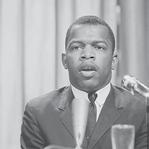






Any vendor of The Contributor can accept VENMO as payment.
Technology is a barrier to those experiencing homelessness. Many of our vendors don’t have phones or bank accounts, or use online commerce. We simplified the Venmo process by using one account for all vendors. You must identify your vendor when using Venmo.
ADDITIONAL TIPS IF YOU'RE A FIRST TIME VENMO USER:
You must have a Vemno account to send a Venmo payment.
SCAN THE SQUARE QR CODE above or in the top left corner of the cover of this paper using your phone or tablet camera.
Click the blue “Pay or Request” button on The Contributor's account.
Type in the amount you wish to pay The paper costs $2. Tips are welcomed. Vendors get all the money you send by the next business day.
Type your vendor's name and four digit badge number in the “What’s this for?” box. You must identify the vendor you are paying. Their name and 4 digit



badge number may be written on the front cover of the paper below the QR code.
The first time you pay The Contributor using Venmo you will probably be asked to enter the last 4 digits of their phone number to verify you know who you're sending to. Type 6829 in this field.
Since The Contributor started in 2007, more than 3,200 different vendors have purchased $2.3 million worth of The Contributor and sold over six million copies, generating over $15 million in income for themselves.
In 2019, our C.O.V.E.R. Program (Creating Opportunity for Vendor Employment, Engagement, and Resources) was the natural expansion of our mission of removing obstacles to housing. We now offer full case management, assistance with housing and rental expenses, addiction recovery, health insurance, food benefits, and SSI/SSDI assistance. We see the one-stop-shop team approach radically transforming a vendor's image of self and their place in community.





“The Contributor” está trabajando con uno de los principales periódicos en español La Noticia para llevar contenido a más lectores en Middle Tennessee. Nuestros vendedores de periódicos han pedido durante mucho tiempo que nuestra publicación incluya contenido que apele al interés de residentes de habla hispana en nuestra comunidad.
“The Contributor” is working with one of the leading Spanish-language newspapers La Noticia to bring content to more readers in Middle Tennessee. Our newspaper vendors have long requested that our publication include content that appeals to the interest of Spanish-speaking residents in our community.

del 19 al 25 de septiembre de 2024, presentando una
150 películas de todo el mundo.

El festival se llevará a cabo en algunos de los principales lugares artísticos de Nashville, como el Belcourt Theatre, el Regal Green Hills y el histórico Franklin Theatre. Los asistentes no solo podrán disfrutar de proyecciones de películas, sino también de discusiones profundas con cineastas, paneles de desarrollo profesional, eventos sociales y más.
Un punto destacado del festival es la Conferencia de Creadores de NashFilm, que se celebrará del 20 al 22 de septiembre en el Hilton Green Hills, donde profesionales de la industria se reunirán para paneles y oportunidades de networking.Los boletos para películas individuales y eventos ya están disponibles para su compra, y las credenciales VIP ofrecen la mejor experiencia del festival.
El Papel de NAHCC en la Celebración del Cine Hispano
Durante los últimos 15 años, la Cámara de Comercio Hispana del Área de Nashville (NAHCC) ha presentado el Premio NAHCC a la Mejor Película Hispana en el festival. Este prestigioso premio honra las películas con temas hispanos que reflejan la rica diversidad y la vibrante cultura de las comunidades hispanas y latinas. El premio reconoce películas que fomentan la inclusión y amplifican las voces de los cineastas hispanos, promoviendo una comprensión más profunda de sus experiencias culturales.

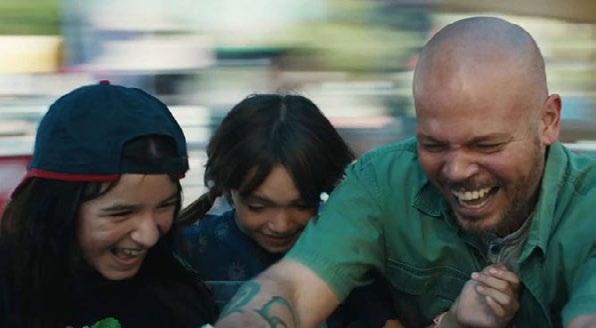
La ceremonia de entrega de premios se llevará a cabo el domingo 22 de septiembre a las 4 PM en el Hilton Green Hills, donde también se presentará un premio artístico especial del renombrado artista hispano José Vera González. Esta colaboración destaca la resiliencia de las comunidades hispanas y su contribución al cine.
Películas Hispanas Destacadas
Border Hopper (Cortometrajes Narrativos): Sigue a Laura, una cineasta latina, mientras navega los desafíos de inmigración mientras se esfuerza por dirigir un comercial para el Super Bowl. Sábado 21 de septiembre, 4:00 PM @ Regal Green Hills Theater 16
Solo Otra Día (Cortometrajes de Tennessee): Muestra el día a día de Jaime, un inmigrante hispano de mediana edad, mientras trabaja para mantener a su familia. Sábado 21 de septiembre, 11:30 AM @ Regal Green Hills Theater 2
¿Que hacer en caso de una redada?
1. Mantenerse callado
2. Sólo dar nombre y apellido
3. No mentir
4. Nunca acepte/lleve documentos falsos
5. No revelar su situación migratoria
6. No llevar documentación de otro país
7. En caso de ser arrestado, mostrarla Tarjeta Miranda (llámenos si necesita una)
Basados en la Quinta Enmienda de la Constitución, los derechos de guardar silencio y contar con un abogado fueron denominados Derechos Miranda luego de la decisión de la Suprema Corte de Justicia de Estados Unidos en el caso Miranda vs. Arizona, 384 U.S. 436, de 1966.

In the Summers (Nuevas Directoras): Un drama familiar que sigue a las hermanas Violeta y Eva durante cuatro veranos con su padre impredecible en Nuevo México. Domingo 22 de septiembre, 11:00 AM @Regal Green Hills Theater 15 Ángel y Perla (Cortometrajes Narrativos): Una agente inmobiliaria
neurótica idea un plan loco para evitar separarse de su pareja. Domingo 22 de septiembre, 12:00 PM @ Regal Green Hills Theater 3
The Masterpiece (Cortometrajes Narrativos): Una pareja adinerada se encuentra con dos chatarreros, lo que lleva a un giro inesperado de los acontecimientos. Sábado 21 de septiembre, 2:00 PM @ Regal Green Hills Theater 15 Sobre el Festival de Cine de Nashville: Fundado en 1969, el Festival de Cine de Nashville (NashFilm) es uno de los festivales de cine más antiguos de los Estados Unidos, celebrando la innovación y las múltiples voces del espíritu humano a través del cine. El festival ofrece más de $100,000 en premios y brinda a los cineastas la oportunidad de competir por la elegibilidad para los Premios de la Academia® en las categorías de cortometrajes.Con su vibrante mezcla de cine, música y cultura, el Festival de Cine de Nashville sigue conectando y atrayendo a cineastas y audiencias, consolidando su lugar como un evento cultural emblemático en la ciudad.
Envíenos sus sugerencias por e-mail: news@hispanicpaper.com ó 615-582-3757
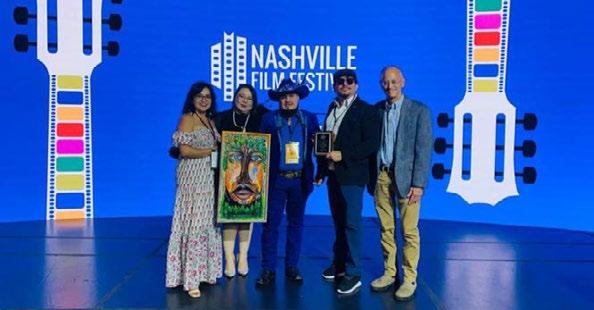

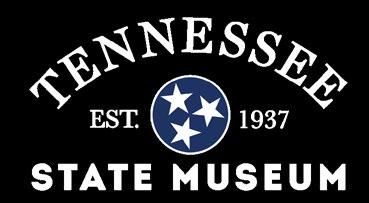

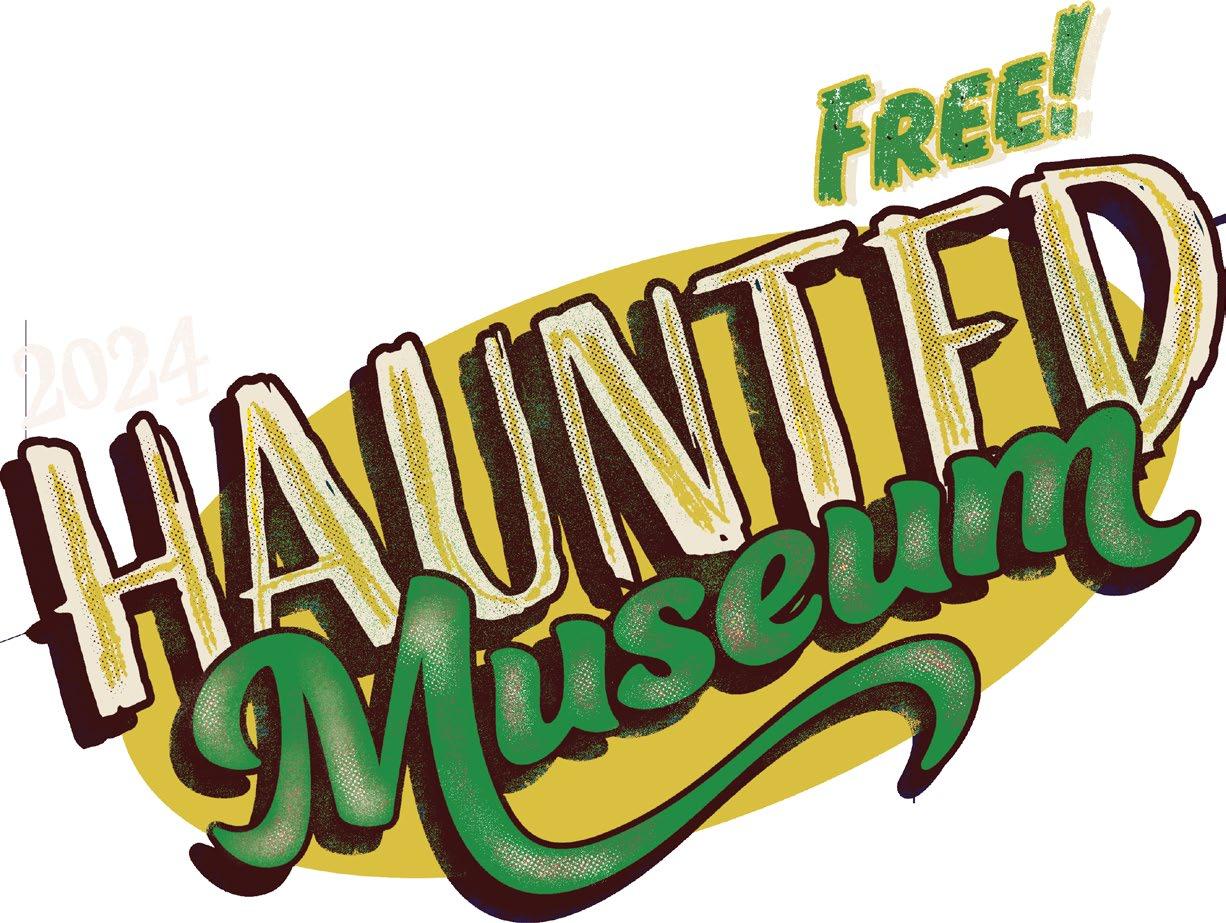
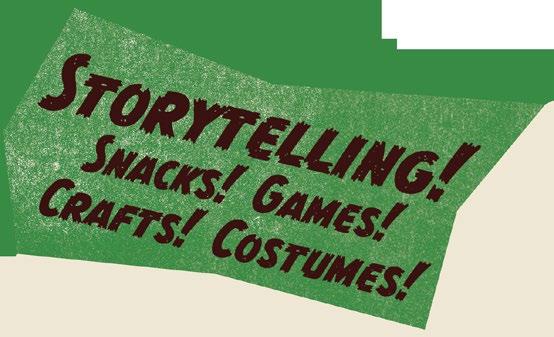







BY RIDLEY WILLS II
In 1863, the Federal Army stationed guards at a stop on the railroad from Nashville to Johnsonville, a landing on the Tennessee River in Humphreys County, where supplies were stockpiled for shipment by rail to Nashville. The stop was known as Mile 42 Post. Later, the tiny community was named Sneedville in honor of a Union army engineer who worked on the railroad. Sneedville later became Dickson, named for a Nashville Congressman.
Charlotte, a village a few miles to the north became the county seat of Dickson County carved out of Montgomery and Robertson counties in 1803. A year later, the county seat was located at Charlotte, Tennessee named for James Robertson’s wife.
The town center of Dickson is on the “Tennessee Divide.” This is because the south side of downtown drains into East Piney River which empties into Piney River, a tributary of the Duck River. The northeast side of downtown drains into Turnbull Creek, a tributary of the Harpeth River, which empties into the Cumberland River north of Ashland City.
Downtown Dickson burned twice in the 19th century so the downtown today consists primarily of one and two story brick buildings built early in the 20th century. One of them is the two-story Halbrook House, now converted into a hotel that was put on the National Register of Historic Sites in 1990.
In 2020, Dickson population was 16,058, 87 percent of whom were white and eight percent were African-American. Because of the city’s proximity to Nashville, part of its rapid growth is because so many Nshvillians are being forced to move out of Davidson County because they can not afford the rapidly rising property taxes. Many Dickson citizens work in Nashville.
For many years, Dickson County Sheriff, Tim Eads, was Police Chief for the City of Belle Meade. When I was board chairman at Montgomery Bell Academy (MBA) in the 1990s, two of our teachers were Ed Caudil and David Brown. Both were also excellent football coaches on MBA’s always formidable teems. In 1972, Dr.
James Dickson, a former quarterback on the Dickson County High School football team, became a licensed dentist. Jim and his wife, Faye, who was his administrative assistant, worked in Saudi Arabia for five years in the 1970s when Jim was periodontist and dentist for the Royal Family. Originally practicing in Nashville, Jim and Faye later opened an office in Columbia where he provided top quality dental and periodical service until his retirement in 2024. Fay’s older brother, Jim Sullivan, now deceased, was a force in Dickson, serving as principal of Dickson County High School, superintendent of Dickson County schools and state senator from Dickson.
For many years, Jim and Fay Dickson have been dedicated members of The Downtown Presbyterian Church in Nashville. In 2024, Jim and Faye were partially responsible for Dave and Diane Sheppard joining the church. Dave was for seven years the golf pro at Dickson’s Graystown Country Club.
One of Dickson’ most prominent families, the Jackson family, has a daughter, Amy Jackson Smith, who is a highly respected real estate executive with Engel and Volkers in Nashville. Her father Douglas established the Jackson Foundation in Dickson following the sale of his family’s interest in the non-profit Goodlark Hospital to the for-profit HCA. The foundation had $68,900 in assets in 2022. Finally, Tennesse’s Democratic Governor Frank Goad Clement was a Dickson native.
If I had any advice for Dickson, it would be to fund an industrial park near where State Highway 46 crosses I-40. The other would be to draw the city’s water from the Cumberland River rather than from Piney River which is entirely too small to handle the growing city’s water needs. Dickson County officials have considered bringing water from a pristine stream in neighboring Hickman County, thinking that Hickman County, one of the poorest counties in the state, does not have the resources to stop the effort. A group of farmers in Hickman County has, however, organized to do exactly that. I agree with them.
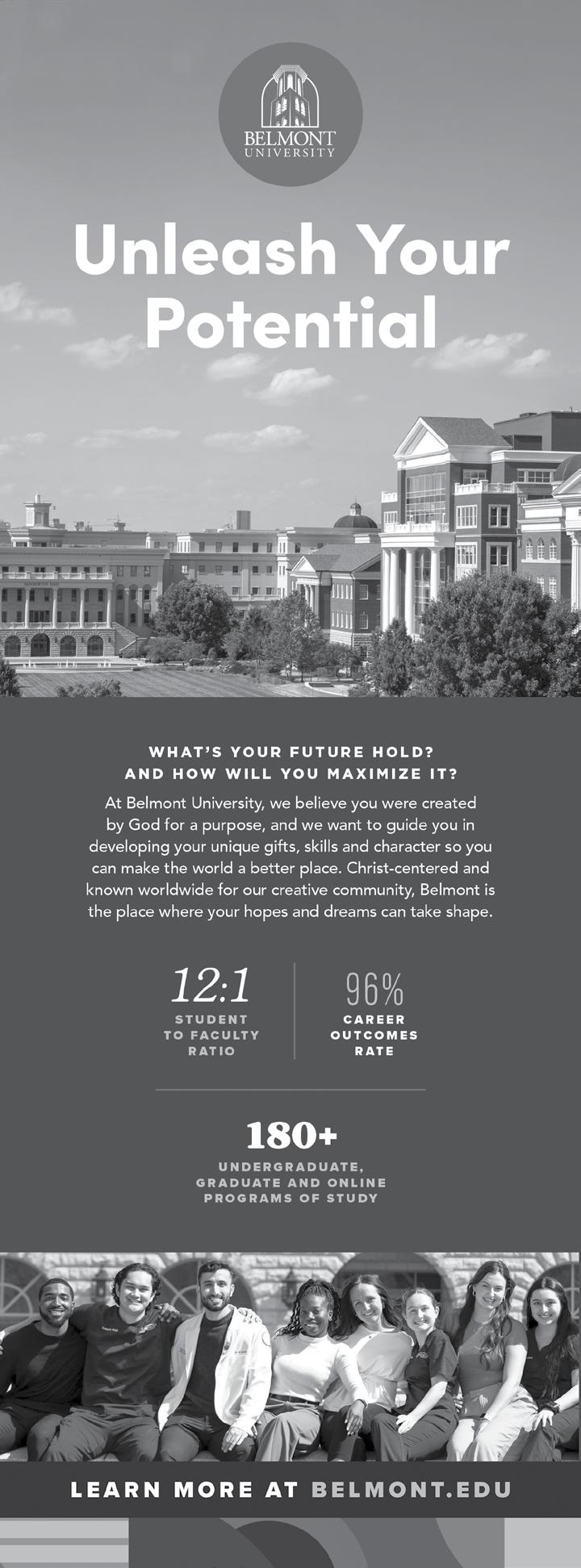
Judge Melissa Blackburn was elected in 2014 to serve on the Division II General Sessions Court. In addition to her duties in General Sessions Court, she presides over the Mental Health Court and the Veterans Court in Davidson County.
Both specialty courts are set up to divert non-violent participants who have encountered legal difficulties, diverting them from jail stays by connecting them with treatment and services. Specialty courts such as the Mental Health and Veterans courts are typically run by judges and involve prosecutors, defense attorneys and other court personnel. In addition, they are strengthened by community partnerships to link people to mental health providers, substance use experts, vocational trainers, housing specialists, and more. The programs are optional, and participants’ progress is monitored by the judge.
Judge Blackburn also established the Davidson County Mental Health and Veterans Court Assistance Foundation to help supplement the cost of the courts. To learn more about the courts, visit davidsonmhc.com for the Mental Health Court and dcvcourt.com for the Veterans Court.
You have been on the bench for 10 years. What was your area of focus before becoming a judge?
In the last two years [before being elected], I joined my husband in his practice where I was dealing with employee rights and making sure that children who are victims of sexual assault by their peers were properly represented and protected in schools. I not only covered Davidson County but also Robertson County, Rutherford County, and some of the other contiguous counties where we were representing children — all of them were in elementary schools, believe it or not.
How did you get to lead the Mental Health and Veterans Court?
When I decided to run, I first decided what division to run for, and I decided to run for an open position, not to take on an existing judge. I knew that Dan Eisenstein was not going to run again. He was the Mental Health Court judge. I had a great interest in the Mental Health Court and felt like I could make a difference there and do good for the citizens of Davidson County.
Was there already a Veterans Court in place at that time?
They were [in the process] of starting one. So, we went to the legislature and obtained funding for the first Veterans Court in Davidson County. There had never been funding in the state of Tennessee for Veterans courts, and that funding we obtained is still in existence and will continue to be in existence for any county in Tennessee that wants to start a Veterans Court. There is money sitting in the state coffers for that. We also got a federal grant that supplemented those funds for us to be able to start a Veterans Court, and we started that in October of 2014.
How is the Mental Health Court funded?
When the Mental Health Court was orig-
BY JUDITH TACKETT
inally founded in 2001, it was funded with a portion of fees from DUI convictions. Over the years, those DUI convictions have dwindled and the fund that was used to operate the court had pretty large drop offs in the amount of money available. Lyft and Uber are great for keeping people from having DUIs and keeping them off the streets, which dramatically decreased the amount of funding we had to run the court. So, we worked with Megan Barry when she was mayor. She supplemented some of the drop off in the DUI funding. Then in 2022, we were able to work with the legislature to get Mental Health Court funding passed for the first time ever in Tennessee.
What are the costs of the courts?
The employees of the court are Metro employees. They're all funded by Metro. The great thing about that is, all the money that we received from the state, which is $300,000 per year, and any funds that we also still received from the DUI fund, all go to direct support of people in Mental Health Court. So, for the full body of all our clients, there is about $300,000 a year for assistance for them.
How many clients do you see a year?
We try to keep a cap on it at 25 per case worker because best practice says that above that you’re harming more than doing good for each person. So, we try to cap it as 125 per year for the Mental Health Court.
The Veterans Court is a smaller operation and has one caseworker. It runs at serving probably 35 to 40 clients per year, and it gets a supplement of $169,000 a year, as of this month, from the state. And again, that employee is also a Metro employee, so all the money that we receive goes directly to assist our clients.
When we talk about assistance for our clients, we talk about dental work, glasses, housing, bus passes — anything that a person could need. That’s what we’re paying for.
How do the courts work and what makes each one successful or not?
What makes each one successful is you take the person as you find them however they are. They're evaluated by a state evaluation system that everyone uses across Tennessee. It has a recovery core. Based on that we accept them into the court system.
From there, the case worker comes up with a plan as to how to work with each person [and determine] what’s going to happen next. Are they going to an inpatient treatment facility? Are they going to a halfway house? Do they need to see a therapist? Do they need clothing? Do they need medication? Do they need to go to AA or NA meetings? I mean [we consider] everything they need.
From the very start, there’s a plan that's laid out, and from there you help that person. Every single one of them is coming from jail and most of them have absolutely nothing, so you have to start and help the person put their life back together again. You have to surround that person with all of the love and support that they need to help them get out of the situation that they’re currently in and
back to a much better situation in society.
How much does homelessness play a role in your courts?
I would say a third of our clients are homeless. A big part of the problem that we deal with for this specific population is that they tend to refuse services and refuse medication. We are a voluntary program, so a lot of times you have to convince them that this is in their best interest.
We also run into a situation where a lot of the housing placements and halfway houses that would normally work with court programs are reluctant to take people with a severe and persistent mental health issue. We sometimes also deal with people’s desire not to be in a housing situation that we offer like a halfway house or another placement.
Our caseworkers do yeoman's work in terms of locating and securing housing for our clients. And sometimes it takes two or three housing placements before they stick.
What happens if someone refuses to participate in the program even though they had initially agreed to do so?
If they absolutely refuse to take medication or they refuse to stay clean and sober, they go back to jail. Depending on how severe their violation is [determines] on how long they sit in jail and have some time to think about what they've done and decide whether they really want to do this [program]. And after talking to their attorney and having basically a timeout to decide whether they really want to do this, then the client specialist will find the time and make the effort to find them another housing placement and start over.
We will not release anyone to the street. Absolutely not. They have to have a housing placement. And they will not go to the Mission (Nashville Rescue Mission) either. The Mission to me is [like releasing them] to the streets because there is no supervision. There is no accountability as far as the medication is concerned. That’s not a viable solution.
In general, what other jail diversion programs would you like Davidson County to invest in?
Davidson County really is ahead of the curve when it comes to alternative and diversion programs. We’ve got Ana Escobar, one of our judges who has the Human Trafficking Court, which is called Cherished Hearts. Judge Gale Robinson who started the DUI Court also runs the Recovery Court, which used to be called Drug Court. Judge Rachel Bell has her Community Court.
So, we have six or seven specialty courts that are focused on not making jail the first and only answer when someone needs help and avoid that they’re just getting a jail door slammed in their face. Davidson County is really leading the way in this and it’s something we’re really proud of.
Are you aware of our Incompetency Docket?
No.
We are, I believe, the only one in the
country doing it. If someone is having some type of an unusual behavior, their attorney can ask that they be evaluated by Vanderbilt. Vanderbilt evaluates them, and if they decide that they need further evaluation, they are then evaluated at MTMHI (Middle Tennessee Mental Health Institute). And MTMHI can tell us then what they need. Are they competent? Are they incompetent? Do they need additional services? And if so, what services they need.
There is an entire docket that’s created from the very point that their attorney says we need to have this person evaluated. And those cases moved to the incompetency docket. If a person is determined to be incompetent, they get out of the regular justice system, and we try to give them a soft landing with the support they need to try to keep them from committing additional crimes.
When did the incompetency docket begin? It started in 2021. Larry Brown on April 16 of 2021 attacked five nurses going to work at Saint Thomas Midtown. He attacked them in the parking garage as they were coming to work. He was the impetus for the incompetency docket.
He was found incompetent, and his cases were nolled (nolle prosequi is a legal term referring to when a prosecutor drops a case). Two weeks later, he committed some more crimes, and his cases were nolled. At that point I called the District Attorney, Glenn Funk, and the Public Defender, Martesha Johnson Moore, and said, “OK, we’ve got to do something. This isn’t working.” And the three of us put our heads together and got Centerstone, MTMHI, Mental Health Coop, Park Center, anyone in Nashville how dealt with this population.
Over the next year, we put a study group together to try to figure out how to properly address this population. We found that there were 182 people at that point in the prior 18 months who had been deemed incompetent and had not been addressed. We figured out that there was such a need in Davidson County that we had to address these individuals. We asked the Mayor for $1.9 million, and he gave us $600,000. And every year since then we have been reupping our $600,000 to address this population.
Can readers support the Mental Health or Veterans courts you lead?
Absolutely. These courts are community-based programs and members of the community can get involved if they want to. For instance, in the Veterans Court we have a mentor program and people that have served in the military who want to assist their fellow Veterans can become mentors in the program. And that's just being there, a shoulder to cry on, and being someone who understands their military experience in a way that a lot of us can’t.
People can also contribute because we now have the Foundation. We will use any donation to supplement items that we cannot pay for with grants because they don’t fall under the state guidelines.




































































































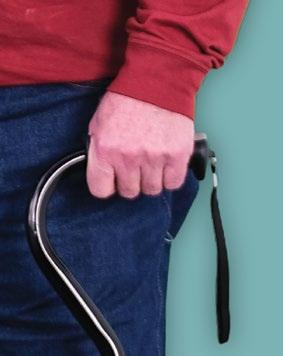








Listening is a fundamental key to effective street outreach. Let me explain.
Two things happened the day I started working on this column. One, I began reading Charles Strobel’s book, The Kingdom of the Poor: My Journey Home , after attending the Tennessee Writers Stories series at the State Museum. And two, on my way home from that event, I listened to a podcast called A Formerly Homeless Person’s Guide for Journalists produced by Mark Horvath, the founder of Invisible People. Both the book and the podcast made me think about how we treat our unhoused neighbors, especially considering that in the past few weeks there has been a lot of stigmatization of the homeless population and of service providers in our community. I observed divisive language that has been used by some media outlets and in some public meetings. There are two main events going on regarding outdoor homelessness as of this writing: one is the dismantlement of six structures in a large encampment called Old Tent City, south of Downtown, and the other is the determination about whether Metro Parks is going to provide permits for street outreach.
In both cases there was a lot of misinformation flying around in every direction. In both cases the voices of people with lived experience, the people who are directly affected, were hardly heard. In both cases street outreach groups stepped in to try to represent the dignity of people living on the streets and in encampments. In both cases there is a sense of “them versus us” that reporters have been highlighting and, to some degree, stoking.
Talking and listening to each other builds the foundation of trust. We all understand this in our personal and professional lives when we are dealing with family, friends, coworkers, and peers. However, when it comes to how we speak to, listen to, and communicate with people experiencing homelessness, we seem to know what’s best for them without actually listening to them.
Let me zoom in on homeless street outreach. For one, it is not only in Nashville that politics and policies are largely focused on managing outdoor homelessness. In a recent blog posted by the National Alliance to End Homelessness about what prevents progress on unsheltered homelessness, the author Nicole DuBois writes: “As unsheltered homelessness has received more attention, it has increasingly been seen through a political lens by some elected officials … communities noted additional challenges related to politics and policy. Among the factors that complicated their work were:
• difficulty navigating changing political winds that can affect funding,
BY JUDITH TACKETT
“A local homeless man named Doy terrorized the parish with his demands. We replaced the storm door at the rectory several times after he kicked it in. His language was X-rated, and he stayed on the porch all day long demanding his just due. I was the object of a lot of his venom ... everyone in the parish wanted to avoid him and – even worse – was afraid of him. Everyone, except Mary Hopwood. She always spoke quietly and respectfully to Doy. She was the only one who would listen to him, even though his mental state was irrational and rambling, and she was the only one he would listen to.
In time I realized that I didn’t really love Doy as Mrs. Hopwood did. I only wanted to change him. I was disrespecting him and so I got disrespected in return. Once I realized that he was not my problem to solve but my brother to love, the change was almost immediate. I changed and he changed, and we grew to know and love each other.”

• jurisdictional tensions over responsibility and differing approaches to the issue, and
• the varied and substantial administrative requirements related to different funding sources.”
Street outreach plays a huge role in a functioning, housing-oriented system. And street outreach needs to be more than just handing out water and food. It is about relationship building and engaging best practices such as trauma-informed care, motivational interviewing, and assertive engagement. Street outreach takes time and outreach staff has a dual role in linking
people to services and helping remove barriers to housing while also keeping them alive.
I have heard multiple times from outreach experts that they struggle to get a person to agree to work toward housing — and then, all of a sudden, that person said yes. I recall a formerly unhoused person once telling me that she kept saying no to this outreach worker because her hopes had been crushed so many times before. But eventually, she had enough trust to give housing one more try if that one outreach worker was walking alongside her. She was in housing when she recalled this story. And she added that
in her mental state she could not have accessed housing without the assistance of her outreach worker. Once in housing, she was able to get the medication she needed, calm down, and move from a daily survival mode to planning her future.
The podcast I mentioned above features a conversation between Mark Horvath, the founder of Invisible People, and Shawn Pleasants, a Yale graduate who worked on Wall Street before becoming homeless. When you listen to the first 12 minutes, you will hear an explanation of why people living outdoors may seemingly be reluctant or even shy away from accepting assistance at first.
So how many people are sleeping outdoors in Nashville and what do we know about them?
The official government data based on a one-night count conducted in January every year is 725. This is the highest it’s been since we’ve improved our count methodology in Nashville. Whenever I mention that number to Contributor vendors, however, I get a lot of boos and corrections. The consensus is that this is a huge undercount, which research has shown is true. Regardless of accuracy, the fact remains that these 725 people were found sleeping outdoors in Nashville on the night of Jan. 26, 2024.
But counts alone do not tell us much about the population. Here are some characteristics of Nashville’s outdoor population based on the 2024 Point In Time Count.
The 725 people living outdoors represented 653 households. Two of those households include a total of 9 individuals in families with children.
When looking at the 716 adult-only individuals:
• 36 or 5 percent were considered youth (age 18-24) and 176 or 25 percent were aged 55 or older.
• 205 or 28.6 percent identified as women; 492 or 68.7 percent as men; and of the remaining people, two identified as transgender, five as non-binary, two as questioning, three as different identify, and seven as more than one gender.
• 199 or 27.8 percent identified as African American and 425 or 59.4 percent as white. For a full breakdown on race, see the chart.
• 425 or 60 percent experienced chronic homelessness.
• 58 or 8 percent were Veterans. In addition,
• 82 percent who were surveyed reported that their last permanent address was in Middle Tennessee.
• 51 percent were staying in encampments, 27 percent on the streets/ sidewalks, and 6 percent in vehicles.
• 19 percent said they were having pets with them.
• 48 percent reported having a severe and persistent mental illness.
• 47 precent said they have a substance use disorder.
• 2 percent were diagnosed with HIV/AIDS.
• 15 percent were adult survivors of Domestic Violence.
The U.S. Department of Housing and Urban Development (HUD) organizes different geographic areas that are eligible for federal homelessness dollars. These areas are known as Continuums of Care (CoC). Each CoC is required to submit PIT Count data. Locally, the Office of Homeless Services serves as the CoC Lead agency that
Multiple Races & Hispanic/Latina/e/o: 5
White & Hispanic/Latina/e/o: 2
White: 425
collects and submits that data to HUD.
Now that you know some of the data and characteristics, let’s return to the importance of engaging people and asking them what they need. Systems are built to improve efficiency in service delivery. However, sometimes, we may take it too far and focus on systems building so much that data overshadows the person who is before us. In my opinion, seasoned street outreach workers are the remedy to that when addressing outdoor homelessness.
Many street outreach workers are hired as entry level staff. Based on some of the characteristics I just showed, many people living outdoors have high acuity levels and deal with complex issues that lead to multiple barriers that prevent them from accessing housing on their own. If that’s the case, shouldn’t we have our best trained and most experienced staff on our street outreach teams? Burnout amongst street outreach workers is very high, which means we also need team leaders who understand how to support their peers in doing this work effectively and with a person-centered approach.
And, to sum up what I concluded after listening to Shawn in the podcast
Multiple Races (not Hispanic/Latina/e/o): 32
American Indian, Alaska Native, or Indigenous: 22
American Indian, Alaska Native, or Indigenous & Hispanic/Latina/e/o: 2
Asian or Asian American: 2
Black, African American, or African: 199
Black, African American, or African & Hispanic/ Latina/e/o: 2
I keep citing, we need to learn to listen. For all the years Shawn had spent on the streets and for all the relationships he built with outreach workers, it was a former acquaintance from Yale who asked him for the first time what he needed. He did not even understand what she meant because he was used to interacting with people who came with offerings and wanted to serve him based on what they thought he needed. But no one ever truly sat down and asked him about all that he needed.
Another thing Shawn said that confirmed my experiences when talking with and listening to people outdoors is that it’s sometimes easier for people to tell a stranger that they are fine where they are and do not want housing rather than open up and make themselves even more vulnerable. I have only once in over 25 years met a person who chose to abandon his apartment. He moved into his van because, as he explained to me, he only had months to live, and he preferred to die amongst “his people.”
This leads back to the importance of listening and truly communicating with each other. Often we listen for what we want to hear to support our own stereotypes. That’s where judgment
Hispanic/Latina/e/o: 23
Native Hawaiian or Pacific Islander: 2
and misunderstandings begin.
So, rather than pushing more laws and resolutions to manage and control outdoor homelessness to satisfy the NIMBY (Not In My Back Yard) folks and politicians, why don’t we just all come together and have the courage to listen to the people where they are. For the ones of you who fear that this means people want to remain outdoors, I guarantee you, that will be a miniscule percentage of the unhoused population. In the end, we all want the same: a safe place to stay that is ours, to be able to maintain our housing, a purpose, feeling healthy and well, and be part of a community.
Let’s stop offering what we think others need and start with listening. To do so, let’s stop our local government’s increasing attempts to regulate street outreach. Instead, we should focus on coordination with outreach providers through open conversations and transparency, which will build trust and further collaboration. Top down government control will not reduce outdoor homelessness. However, a compassionate and person-centered approach that links people to housing and the support services they tell us they need might just do the trick.








BY DANIEL K., CONTRIBUTOR VENDOR BY DANIEL K., CONTRIBUTOR VENDOR
Had no idea who I am, Insecurity turned to awareness A want to be special. It drove me crazy. Started realizing I had potential and substance.
BY NORMA B., CONTRIBUTOR VENDOR
1.) Everyone wants peace
Why is it SO elusive?
In the world today
When we do come together
It’s easily torn apart
2.) Family includes
Both the one you’re born into
And the one you choose
Both equally important
To the one making the choice
3.) Cats are finicky
They have a mind of their own
They give affection
In cuddles snuggles and purrs
Without them life would be dull
4.) A creative mind
Ideas constantly flowing
Through one person who
Needs an outlet to show their
Unique types of arts and crafts
5.) Blue water green trees
Bring soothing serenity
Quiet solitude
Sunlight beaming through the trees
Only nature offers these
6.) Cooperation
People working together
In sync as a group
To achieve a common goal
Differences set aside
7.) How much time we have
There’s no way to know for sure
Make each moment count
Time is one directional
You can’t get it back-I know
8.) Physical beauty Is fleeting it fades with time
Inner beauty stays It increases in value
Like gems of the rarest kind
9.) You can find beauty
In the strangest of places
What you’re looking for That is what you’ll often find All based on your state of mind
10.) The flavors of life
Some are sweet others are sour
Salty or bitter
And everything in between
Based on what’s in the recipe
11.) Enthusiasm
Excitement that’s unrestrained
Boundless energy
Relentless pushing forward
Never giving in to fear
12.) Picture perfect scenes
Can easily be disturbed
One thing out of place
Throws things into disarray How do you restore balance
Where do you belong
The question I ignored I pick up and score
The ball is in your court
The audience start to cheer
The lie you choose to live.
BY DANIEL K., CONTRIBUTOR VENDOR
Whether good or bad. You do not undermine. To find a new location. It could be in your mind. A way to overcome.
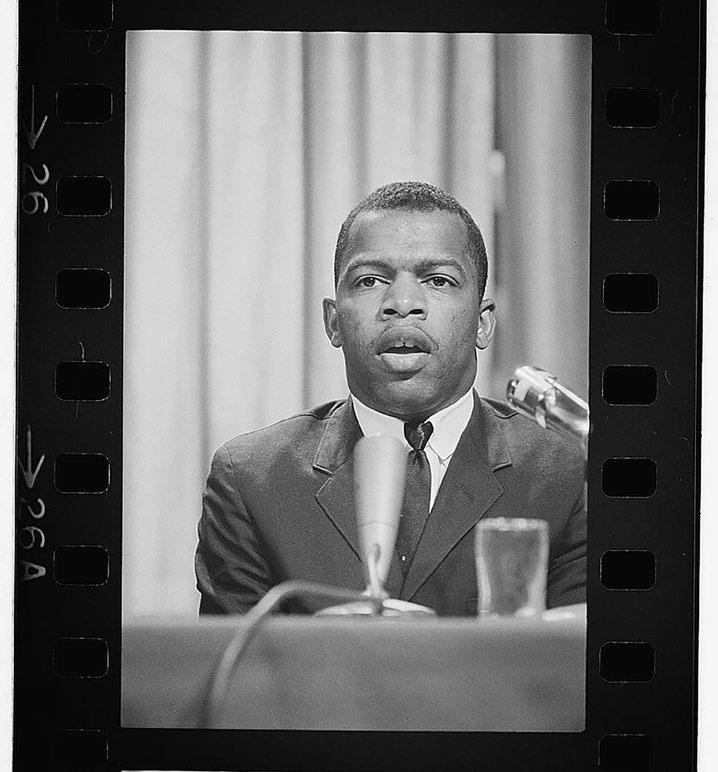
BY FREEPRESSGMA, CONTRIBUTOR VENDOR
Thank you for doing the hard thing. Though I was just a child, my predecessors lacked mercy. Therefore, you required justice. Perhaps it was the Creators’ mercy that granted your desires. Not mercy for your people, but for mine. Without your courage, we Caucasians would not
have met the Divine - both in you, and in our hearts.
Perhaps, many decades after Ms. Shirley Chisholms’ brave run, we shall finally have a woman President. Her understanding and commitment could lift us out of the morass of moral culpability.

Charles Strobel’s memoir reflects his legacy of communing with others
The Kingdom of the Poor: My Journey Home
By Charles Strobel
Vanderbilt University Press
150 pages
$29.95
Each year, several organizations pull together and host a Homeless Memorial on the riverfront in downtown Nashville. This event, which honors all the folks who’ve died living on the streets in the previous year, is held in the cold of December on a Saturday, and it’s often a morning of somber reflection on all that has been lost.
One time, as folks bowed their heads for prayer after a particularly brutal year, I started to look around and noticed that a dog was watching folks, almost like it was wondering what in the world these weird humans were up to. I locked eyes with another friend who had seen the same thing, and we started to chuckle a bit, losing most of what was said in the prayer and focusing largely on just how odd this dog found the entire ordeal.
As the prayer came to a close, my friend and I saw Father Charles Strobel headed our way. I didn’t know Strobel that well and started to feel slightly em-
BY AMANDA HAGGARD AND CHAPTER16.ORG
barrassed that he may have noticed us not engaged in the very important remembrance happening that morning. As he approached, he leaned in close, smiled conspiratorially and said: “You know, dog is just God spelled backward.”
Strobel, who passed away in August 2023, is best known for his work creating Room in the Inn, an organization that connects congregations across Nashville with people who need emergency shelter in the winter cold, among other things, but he was also an engaging storyteller and a person who loved to provide even a moment of respite for others.
Near the end of his life, Strobel worked on a memoir, The Kingdom of the Poor: My Journey Home. With the help of two editors (his niece Katie Seigenthaler and Amy Frogge), the book will be released this month by Vanderbilt University Press. Reading this posthumous memoir is a lot like experiencing Strobel in person. His stories welcome you into his life. He’s always a little bit mischievous in his delivery. He is calm about his faults and mistakes in a way that is reassuring.
In a section of the book called The Miracle of Forgiveness, he writes about a conflict he had with a childhood friend
named Billy Denton at around 7 or 8 years old and how shocked he was by the rage and resentment he experienced. His friend had gotten the better of him, and his anger built up such that the next time they were rolling in the grass, Strobel felt like he had it within him to end the other boy’s life. He stopped before it got to a life-altering event, but the moment gave him a grounding point throughout his life to understand how others might commit violent acts, hold grudges, or let things fester to unhealthy points. He relates this to his work advocating against the death penalty, which became a large part of his life after his mother, Mary Catherine Strobel, was murdered in 1986.
He writes, “Jesus invites us into a world without condemnation. ... The choice now becomes ours. We can hold each other in our mistakes, or we can let each other go. We can be a prison to one another or the source of release. Both are choices. One leads us to separation; the other leads us to communion.”
It’s this level of honesty and wisdom that tells us Strobel is talking through forgiving the great sin of murder as much as he is forgiving himself for having the thought. He ends each chapter of The Kingdom of the
Poor with one of the sayings of Jesus known as the Beatitudes, and he writes early on that the book will be full of stories and memories he calls “Beatitude Moments,” which he describes as “totally unexpected, grace-filled experiences when one is filled with love. We remember them as divine gifts from above — not simply memories.”
What’s most beautiful about this book is that it’s not just about Charles Strobel. It’s about the people who crossed his path as well. From the characters who challenged him to the folks who guided him in his daily thoughts and actions, the book sees Strobel through his lifelong experience in connecting with others.
Strobel’s stories show us how to genuinely commune more with the people who enter our lives. His life and his memoir call us all to seek Beatitude Moments — unexpected, grace-filled experiences that remind us to see the divine in the everyday, even in a dog’s curious gaze during a prayer.
To read an uncut version of this review — and more local book coverage — please visit Chapter16.org, an online publication of Humanities Tennessee.

DOWN
1. Facebook owner
2. Quickly, acr.
3. Hundred thousand, in India
4. Sahara's Berber people 5. R in R.E.M.
6. Wash out with solvent
7. Workbench holding device
8. *Plato's famous teacher 9. Ripped
10. Black tropical cuckoo 11. *Not black-figure, but ____-figure
13. Spacecraft's detachable unit
14. W.E.B Du Bois's org. 19. Oxygen-containing compound
22. *Olive derivative
B & B
Sunni religion 39. Et alibi, abbr. 40. Newspaper VIP 42. First woman, Biblically-speaking
43. Return of disease 45. Washer, during a certain cycle 47. Last month
Belittle 50. Taro plant 52. *Athenian Acropolis tourist attraction
56. Anticipate
57. Black-and-white cookie
58. Small European freshwater fish
59. *#18 Across, to Romans 60. Big cat sound
61. Future atty.'s exam
62. Work units
63. Tight one, in football 64. Sunrise direction
23. More reprehensible 24. About to explode
25. Kidney-related
26. Exertion
27. Christmastides
28. Have a hankering
29. *Poet of "Iliad" fame
32. Ocean motion
33. "Wheel of Fortune" request (2 words)
36. *"I, ____"
38. Like Bushmills whiskey
40. Boston time
41. *Demosthenes of Cicero
44. Land parcels
46. Conifer's leaf
48. New York Jets' quarterback
49. Bakery offering
50. Pitcher
51. "Shoot!"
52. Minute opening
53. Civil space org.
54. #22 Across, pl.
55. Left after deductions
56. Map abbr.
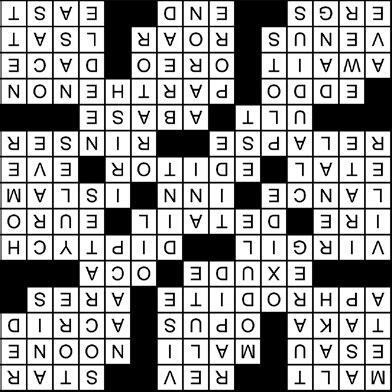
Written by Chris Scott Fieselman, Vendor #0015
Pastor Ken Locke and this homeless guy Chris Scott. I remember every Sunday morning breakfast, Always starting at 8 o’clock.
Which right now might not seem like a lot. But to many back then, it made a big difference, And I got to be the one to welcome them in. Finding contentment when you don’t have a pot... And a tent and a sleeping bags all that you’ve got. But, you’re never alone amongst friends... They might not have a house, Or even be ready to be in an apartment.
But I can see them surviving. More than that, I can see them thriving on Government Provided Land. Beginning again if given a hand.
A chance and a brand new experience.
A sense of achievement and accomplishment. No doubt about it they need a way out. Why not a Long Island Song Writer singing about, The Proud Sound of Freedom, And “The Song of the South”
What’s inside of you?
That makes you do the things you do? What have you seen and what have you been through? That makes you even worth listening to?
Are you sharing something Old Fashioned? Or something Completely New? If given the opportunity to share your point of view? Is someone doing better off because they come across you? Did you leave them with something to think about? Or something to look forward to?
Like leading by example to a brand new confused recruit? Who just happens to share your point of view? And the passage of time with its rhythm and rhyme, Is always in Hot Pursuit.
When it’s not about the money, it’s all about the truth... When the whole world says that it can’t be done, Do you offer up living proof? Walk a mile in my shoes. Like everyone else I’m just paying my dues, And this is the life I choose.
Always having something to look forward to. When it comes to helping the Homeless, I can tell there are many just helping themselves, To a lot of ill-gotten loot...
A Long Island songwriter in Nashville, Tennessee?
I can only think of two Long Island songwriters, Billy Joel and Me.
I’m sorry Music City but you’re stuck with me. Basically putting out a new song every week. Words penned that were meant for someone to speak. Just what the doctor ordered for, Someone going through hard times, Or suffering a losing streak. They don’t know that they need it, And I’m playing Hide and Go Seek...
If this is your land? As an American? Why is so much of it given to?
Wealthy Development?
How much will that help them? And when will this end?
All of this “I don’t want to live so close, To a Dirty Homeless Camp” Can probably be solved, By providing them with, A much needed garbage can. Help them be able to take care of the land. Some you can help. Some you can’t. Let’s see what happens when you lend them a hand.
It has to be done right. It has to be planned. What might make a difference?
With the money that’s spent. And change their complaints into compliments. Wouldn’t that be an accomplishment? It’s not that hard to understand, People need a safe place to begin again. The unhoused that for now have to live in a tent, Knowing they’re never alone amongst friends. Who are going through the same damn experience?
But this big decision and mission, Has been given to Local Government. And those who chose the noble role of, Trusted Public Servant.
Written by Chris Scott Fieselman, Vendor #0015
I can’t tell you what you know already. And I can’t tell you where or when to turn. I know that when I’m gone, You will forget me.
But I pray that you remember, Lessons Learned.
Lessons Learned... I tried so hard to say. Lessons Learned... I left along the way. When I’m gone I know that you’ll forget me. But I pray that you remember Lessons Learned.
They say a wise man he can learn from his mistakes. But a smart man learns from ones that others make. Well, I have made my share, I know it’s true. But I pray that the mistakes I’ve made help you.
Lessons Learned... I tried so hard to say. Lessons Learned... I left along the way. When I’m gone I know that you’ll forget me. But I pray that you remember Lessons Learned.
Lessons Learned. Lessons Learned. Bridges Burned. Bridges Burned. Pages Turned. Pages Turned. Lessons Learned. Lessons Learned.
It’s happening, Virgo! The former things are dying away so that the new things can be born! The leaves are turning from green to brown and blowing across the yards. The sunsets are coming earlier and are more magnificent. There’s pumpkin-shaped chocolates in the grocery stores and pumpkin-spiced lattes in the coffee shops and pumpkin-fried steaks at the steak houses. Even if it’s gonna be worse, Virgo, it’s at least gonna be fresh. But first comes the fall. Problems dry up and blow away. When the new problems come, remember that they’ll do the same.
My phone went off in the middle of the night. One of those built-in alerts you can’t even deactivate if you want to. A terrible screech and gargle that jolted me awake and rolled me over. It took my eyes a moment to focus on the words next to the little emergency triangle, but I already knew what it would say, Libra. You’ve gone missing again. And you’ve absolutely got a right to some time alone — and it’s not that you have to check-in. I just want to make sure that you know we noticed. And we’d love to hear from you as soon as you’re even halfway ready.
Whenever the ragweed starts blowing and my sinuses get stuffy and my eyelids get puffy and I get a little wheeze in my chest, I remember the time in 7th grade when I was walking down the hall in the midst of a full-face-inflating allergy attack and Aimee Wilkerson, the queen of the 8th grade girls stopped and stared at me and when I smiled she pointed said to her friend, as though I was on display at a museum, “What do you think happened to his face?” Anyway, Scorpio, remember that everyone you meet is a whole person in there, even Aimee Wilkerson.
When I was a kid there would be a man in a tie in the TV who would tell what was going on in the world. There were only like maybe three of those guys. I thought they were very boring and I assumed everything they were saying was true. Now I scroll on my phone and see men in ties saying all kinds of things. Some of them are joking. Some of them are lying. Some of them think they are telling the truth. Some of them are women and some of the ties aren’t even ties. If you ever get overwhelmed by the amount of information you’re expected to take-in, Sagittarius, and exhausted by the amount of discernment you’re expected to exercise, you’re allowed to take a break. Walk away from the men in the ties, go outside. Talk to a neighbor you haven’t met. Maybe make them some brownies or help them power-wash their porch. That’s the news.

Just got back from the farmers market with my new pet! He’s super-cute and cuddly and he’s been sleeping in his carrier ever since we got home. The old grizzled wizard who sold him gave me some very specific and dire care instructions before he vanished but I forgot to write them down. Something like “Don’t feed him until midnight?” or maybe it was “No baths before sunset?” I can’t remember what I was supposed to do exactly, Capricorn, but I’m sure he’ll be fine with some trial and error. Oh look! There’s two of them in there now! Anyway, Capricorn, try not to take-on more than you can handle this week.
Turns out everybody in this town is a vampire. I should have realized it as soon as I got off the bus seeing as how I’m a vampire, too. It’s pretty inconvenient, really, all these vampires with no regular people to bite. We come out of our coffins at night and wander the streets, thirsty as all get out with nothing to drink. And we complain that we can’t get enough and that it used to be better around here. But I’m starting to wonder if it’s not the lack that’s a problem. Maybe the problem was always the thirst.
I heard the story of a rich man who wanted his life to be meaningful. Maybe you’ve heard it too, Pisces. He dressed as a bat and went out into the streets to fight crime. And everywhere he looked, there it was. Old kinds of crime and new. And the man who dressed as a bat captured the criminals. And he found a kind of meaning for his lonely life. But I’d love to see a less-gritty re-telling of this story, Pisces. Something a little more true. Maybe the rich man could instead give his money to the poor. And there would be less need. Less desperation. Less crime to fight. And the man could find more than isolated meaning, he could find community. He could even still dress as a bat if he wanted. Anyway, Pisces, what would it mean if you gave it away?
When will this monsterless summer end? It’s hard to get in the spooky-seasonal spirit when I can’t even wear my wolfman costume in the car because I get too hot and have to pull over and take the mask and gloves off before I pass out. Not to mention all the bat-shaped peanut butter cups in my glove-compartment that have each melted into a globby paste. Sometimes, Aries, we’re so ready to get past this present uncomfortable moment and on to what’s next that we end up out-of-sync with what’s actually happening. It’s ok to put the plastic tombstones out in the yard, just don’t be shocked when the lawn guy knocks them over. This growing-season isn’t over yet.
A couple of years ago I bought a big book about how to be a better amateur astrologer. I use it every day. It’s one of those hard-cover 500 page text-book style things. At first I liked the charts in the front and there were a few times that I would look something up in the index in the back. But mostly now I just use it every day when I’m watching movies in bed and need something to set my laptop on to keep it from overheating. We don’t always know what we need, Taurus. And we don’t always need what we get. But at least we can usually use what we’ve got.
I think it’s interesting how quickly technology goes from being cutting-edge to creepy. In 1911, a wax cylinder recording of a child singing “Twinkle Twinkle Little Star” in a stairwell was a technological marvel. By 1955 the same recording could set the tone for a horror movie. It’s like that with crackly detuned radios or wavy lines on a VHS recording. In 20 years you’ll know you’re watching a horror movie when somebody can’t get their old smartwatch to update to the new OS. We fear obsolescence, Gemini, but it’s all made up. You don’t have to be the shiniest, newest, most up-to-date thing to be valid. But I do wish you’d stop singing so slowly in the stairwell.
Well, after visiting four different veterinarians in a week, my cat has finally been diagnosed with a something called “mega-colon,” which I am almost positive was a condition nervously made up on the spot. In any case, he has now received several enemas and a lengthy deobstipation process and has come home with a new expensive food and two new expensive medications and that, Cancer, is why I can’t donate $10 to your campaign before the next deadline. I think relationships work best when we can be open about what we’re going through. If you don’t feel comfortable talking about feline constipation with your friends and candidates, find new ones.
The sign at the middle school down the street says fall break is almost here. I don’t get a fall break, but it does give me a sense of how uncontrollably fast my life is moving. Seems like it was only just summer break and spring break before that. Maybe if we were actually taking some of these opportunities to rest and reflect, Leo, we wouldn’t be so shocked when it was already time for another one.
Mr. Mysterio is not a licensed astrologer, a trained deobstipationist, or a registered antihistamine. Listen to the Mr. Mysterio podcast at mrmysterio.com Or just give him a call at 707-VHS-TAN1
We grew apart when I was real young. He wasn’t born when I was in Cloverbottom Hospital. Well, he was born, but he was young. We didn’t know each other well because when my other brother got murdered, my mind went completely blank and I had a nervous breakdown.
So I had to get to know my brother all over again. He’s my baby brother and he had a twin who died at birth. Over the years, since I was locked away so much of my lifetime, we grew apart several times. But I got to know him in the last ten years real well.
He is extremely intelligent but he started drinking as a kid and drugging real young too. It’s caused him to have cancer of the lungs. He had radiation, but the radiation didn’t take, so he’s in Stage 4. I’m gonna miss him.
My mother had 12 kids. There are only 2 brothers I really have a hard time with and he’s one of them because of his drinking. I lost my place to live with my mom because my oldest brother and my baby brother were both heavy drinkers and they were both smokers. I didn’t lose my oldest brother because of alcohol, I lost him by having a heart attack.
There have been a lot of tragedies in my life, but I’m ready for the Lord when he comes after me. I’m a Christian and I try to live a Christian life. I still curse, don’t get me wrong, because sometimes I get mad, but I don’t lose my temper, I just curse. I try my best not to use the Lord’s name in vain. My church, Ethos, is a beautiful loving church family. They love me and I love them. I want people to know Ethos.
My brother says he knows the Lord, but I don’t know if he does. I’m hoping he does. My baby sister don’t want me there at his funeral, but he told her that he does want me there. She could still stop me from coming after he’s gone and
BY WILLIAM B., CONTRIBUTOR VENDOR
that’s gonna hurt me bad.
I still talk to my baby brother on the phone now. He lives in Gallatin in a group home. Hopefully he won’t have to go to one of those rehabs where they put you on drugs for the pain because I’ve seen a lot of people have to go like that. Me, I don’t want to go like that. I want to go either at church, selling my papers, playing my music, or in my room. I want to go mostly by being in church.
The Contributor has meant so much to me and I tried to get my brother to do it, but he said he couldn’t because he’d want to drink on the job and you can’t do that as a vendor. I have to agree with him on that. You can’t drink on the job. He’s been saving his money and is going to be cremated he said and have enough money to take care of it.
If it wasn’t for my son being back in my life, I probably wouldn’t be alive today because I wouldn’t have much to live for except for doing what I’m doing loving playing music and selling The Contributor being my own boss. Being a vendor means a lot to me and having a place to lay my head at Room In The Inn means the world to me. They have saved my life. They say they haven’t but I say, “Yes you did. You took me in. You helped me stay off of drugs. Yeah, you saved my life.”
I’m coming up in 19 years clean on the 20th of this month. I have tremendous will power once I make my mind up. With The Contributor in my life it’s given me tremendous power to save money. I just about broke myself of going into a store and a pawn shop and buying stuff. I can now go into a pawn shop and not buy something. I’ve done that a few times lately and I’m proud of myself. Because it’s an addiction. I’ve made myself say, “Well, William, you don’t need that! Put your money back in your pocket and roll

your ass out the damn door!” And I did! They will look at me and say, “Ain’t you buying something?” And I’ll say, “No!”
I’m going to miss my brother with my whole heart, but I’m going to try and keep in touch with him every day somehow. I’m going to see him next Saturday just for a minute. He just had an operation. His name is Larry Boyd. I’m gonna help pay for a tombstone to be put up. It’ll say, “This is my baby brother who
I love and am going to miss.” I know the Lord is forgiving, and he’s gonna have my brother up there because he might need a computer worker and my brother knows how to work them! I’ve gotta say that because he’s good at things like that. He’s gonna be missed. That’s about all I can say.
If you like my story, buy the paper, let The Contributor know and God Bless you.

Selected by Charles Williams (1941)
Charles Walter Stansby Williams (1886–1945), the editor of the following selections, is today probably the third most famous of the famous Inklings literary group of Oxford, England, which existed in the middle of the 20th century, and which included among its ranks the better-known and longer-lived Oxford Dons J.R.R. Tolkien and C. S. Lewis. First published in 1941, this series of profound quotations, encompassing all walks of life, follows the sequence of the themes and Bible readings anciently appointed for contemplation throughout the church's year. It is hoped that the readings reproduced here will prove beneficial for any who read them, whatever their place in life's journey. — Matthew Carver
18th Wednesday after Trinity
IF I look singularly to myself, I am right naught; but in general I am in hope, in oneness of charity with all mine even-Christians. For in this oneness standeth the life of all mankind that shall be saved. For God is all that is good, as to my sight, and God hath made all that is made, and God loveth all that he hath made: and he that loveth generally all his even-Christians for God, he loveth all that is. For in mankind that shall be saved is comprehended all: that is to say, all that is made and the Maker of all. For in man is God, and God is in all.
Juliana of Norwich: Revelations of Divine Love
18th Thursday after Trinity
AS I do no good action here, merely for the interpretation of good men, though that be one good and justifiable reason of my good actions: so I must do nothing for my salvation hereafter, merely for the love I bear to mine own soul, though that also be one good and justifiable reason of that action; but the primary reason in both, as well as the actions that establish a good name, as the actions that establish eternal life, must be the glory of God.
Donne: Sermons.
SINCE all sickness and corruption did fall to the flesh when the soul fell from this work, therefore shall all health come to the flesh when the soul by the grace of Jesu—the which is the chief worker—riseth to the same work again. And this shalt thou hope only to have by the mercy of Jesu and thy lovely consent. And therefore I pray thee with Solomon here in this passage that thou stand stoutly in this work, ever more bearing up unto him thy lovely consent in gladness of love.
The Epistle of Privy Counsel THE giving of thanks maketh entreaty of behalf of the feeble before God.
The Paradise of the Fathers
18th Saturday after Trinity
THE word 'humanity' means unredeemed men and women; the word 'history' implies limitation and corruption; the pronoun 'I' spells judgement. Neither forwards nor backwards can we escape from this narrow gorge. There is therefore no alternative for us but to remain under the indictment; and only he who remains here without making any attempt to escape, even by spinning sophistries of human logic is able to praise God in His faithfulness.
Barth: The Epistle to the Romans
WE indeed have these passions by reason of the weakness of our human nature; not so the Lord Jesus, whose weakness was of power.
St Augustine: City of God
THE highest, the only proof of love, is to love our adversary.
St Gregory, quoted in Aquinas: Catena Aurea
Eighteenth Sunday after Trinity
THIS is the light of bare reason or the reasoning faculty of the mind has no contrariety to the vices of the heart; it neither kills them nor is killed by them. As pride, vanity, hypocrisy, envy or malice don't take away from the mind its geometrical skill, so a man may be most mathematical in his demonstrations of the religion of reason when he has extinguished every good sentiment of his heart, and be the most zealous for its excellency and sufficiency when he has his passions in the most disordered state.
William Law: A Demonstration
REPENTANCE is tardy knowledge; innocence from the first is knowledge.
St Clement: Stromata
WHEN we once begin to form good resolutions, God gives us every opportunity of carrying them out.
St John Chrysostom: Homilies
The Feast of St Michael and All Angels
GOD which moveth mere natural agents as an efficient only, doth likewise move intellectual creatures, and especially his holy an-
gels: for beholding the face of God, in admiration of so great excellency they all adore him; and being rapt with the love of his beauty, they cleave inseparably for ever unto him. Desire to resemble him in goodness maketh them unweariable and even unsatiable in their longing to do by all means all manner good unto all the creatures of God, but especially unto the children of men: in the countenance of whose nature, looking downward, they behold themselves beneath themselves; even as upward, in God, beneath whom themselves are, they see that character which is nowhere but in themselves and us resembled.
Hooker: Laws of Ecclesiastical Polity.
THE Cause of all is not one, as one among many, but before every one and every multitude, and it determines every one and every multitude.
Dionysius the Areopagite: On The Divine Names.
19th Monday after Trinity
REPENTANCE is but a kind of table-talk, till we see so much of the deformity of our inward nature as to be in some degree frightened and terrified at the sight of it . . . A plausible form of an outward life, that has only learned rules and modes of religion by use and custom, often keeps the soul for some time at ease, though all its inward root and ground of sin has never been shaken or molested, though it has never tasted of the bitter waters of repentance and has only known the want of a Saviour by hearsay. But things cannot pass thus: sooner or later repentance must have a broken and a contrite heart; we must with our blessed lord go over the brook Cedron, and with Him sweat great drops of sorrow before He can say for us, as He said for Himself: "It is finished."
William Law: Christian Regeneration
19th Tuesday after Trinity
HOW easy is pen and paper piety, for one to write religiously? I will not say it costeth nothing, but it is far cheaper to work one's head than one's heart to goodness. Some, perchance, may guess me to be good by my writings, and so I shall deceive my reader. But if I do not desire to be good, I most of all deceive myself. I can make an hundred meditations sooner than subdue the least sin in my soul.
Thomas Fuller: Good Thoughts in Bad Times
YOU still shall tramp and tread on endless round of thought, to justify your action to yourselves, weaving a fiction which unravels as you weave, pacing forever in the hell of make-believe which never is belief.
T. S. Eliot: Murder in the Cathedral
19th Wednesday after Trinity
IN the midst of my morning prayers I had a good meditation, which since I have forgotten. Thus much I remember of it—that it was pious in itself, but not proper for that time; for it took much from my devotion, and added nothing to my instruction; and my soul, not able to intend two things at once, abated of its fervency in praying. Thus snatching at two employments, I held neither well.
Thomas Fuller: Good Thoughts in Bad Times
GOD hath not forgiven thee thy sins because of thy repentance but because of thy thought to deliver thyself to Christ. The Paradise of the Fathers
19th Thursday after Trinity
WHEN the devil leaves any one he watches his time for return, and having taken it, he leads him into a second sin . . . Something like this took place in Judas, who after his repentance did not preserve his own heart, but received that more abundant sorrow supplied to him by the devil, who sought to swallow him up . . . But had he desired and looked for place and time for repentance, he would perhaps have found him who has said, I have no pleasure in the death of the wicked. Or perhaps he desired to die before his Master on his way to death, and to meet him with a disembodied spirit that by confession and deprecation he might obtain mercy; and did not see that it is not fitting that a servant of God should dismiss himself from life, but should wait God's sentence.
Origen, quoted by Aquinas: Catena Aurea
19th Friday after Trinity
PRIDE calls me to the window, gluttony to the table, wantonness to the bed, laziness to the chimney, ambition commands me to go upstairs, and covetousness to come down. Vices, I see, are as well contrary to themselves as to virtue. Free me, Lord, from this distracted case; fetch me from being sin's servant to be thine, whose "service is perfect freedom," for thou art but one, and ever the same.
Thomas Fuller: Good Thoughts in Bad Times
WOULD wicked men dwell a little more at home, and descend into the bottom of their own hearts they would soon find Hell opening her mouth wide upon them, and those secret fires of inward fury and displeasure breaking out upon them.
John Smith: Discoveries
19th Saturday after Trinity
SOME men the fiend will deceive in this manner full wonderfully. He will enflame their brains to maintain God's law, and to destroy sin in all other men. He will never tempt them with a thing that is openly evil. All men will they reprove of their faults right as though they had a cure of their souls: and yet they think that they dare not else for God but tell them their faults that they see. And they say that they be stirred thereto by the fire of charity, and of God's love in their hearts; and truly they lie, for it is with the fire of hell, welling up in their brains and in their imagination.
The Cloud of Unknowing
[THERE are] . . . those who form too strong a love for one spiritual art, and make, as it were, an end for themselves of this act, and if, by any chance, they lose it, straightaway they despair and cease from all other acts.
St Catherine of Siena.
Nineteenth Sunday after Trinity
HE who did not suffer as the man suffers upon whom hardships and adversity suddenly fall but who has before him every instant the possibility that everything nevertheless might be redressed— for He knew that it was inevitable; He who knew that with every new sacrifice He made in behalf of the truth He was hastening His persecution and destruction, so that He had control of His fate, could ensure for Himself the splendour of royal power and the devout admiration of the race if He would let go of the truth, but knew also with even greater certainty that He would ensure His destruction, if (oh, eternally certain way to destruction!) He were in any respect to desert the truth—how did he manage to live without anxiety for the next day? . . . He had Eternity with Him in the day that is called to-day, hence the next day had no power over Him, it had no existence for Him. It had no power over Him before it came, and when it came, and was the day that is called to-day it had no power over Him than that which was the Father's will, to which He had consented with eternal freedom, and to which He obediently bowed.
Kierkegaard: Christian Discourses.
20th Monday after Trinity
IN suffering and tribulation there are really certain situations in which, humanly speaking, the thought of God and that he is nevertheless love, makes the suffering far more exhausting . . . For either one suffers at the thought that God the all-powerful, who could so easily help, leaves one helpless, or else one suffers because one's reason is crucified by the thought that God is love all the same and that what happens to one is for one's good . . . The further effort which the idea of God demands of us is to have to understand that suffering must not only be borne but that it is good, a gift of the God of love.
Kierkegaard: Journals
GIVE peace, that is, continue and preserve it; give peace, that is, give us hearts worthy of it, and thankful for it. In our time, that is, all our time: for there is more besides a fair morning required to make a fair day.
Thomas Fuller: Good Thoughts in Bad Times
TEACH me the art of patience whilst I am well, and give me the use of it when I am sick.
Thomas Fuller: Good Thoughts in Bad Times



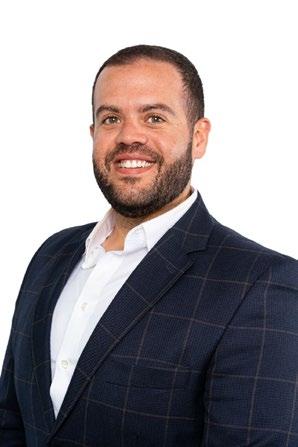






I couldn’t help but brace myself as the movie Civil War cold opens on a speech by its Trump-esque, unnamed third term dictator president played by Nick Offerman, particularly since I was watching on the Monday after the second attempted assassination of former president Trump, but Offerman doesn’t do an Orange Man imitation and is clean shaven and silver haired. Instead, he reminded me more of another scandal-soaked president named Clinton. You’d expect a Hollywood movie to take a swing and Trump and conservatives. Civil War does and it doesn’t. At every turn the movie makes interesting, unexpected choices with how it portrays a contemporary military conflict between Americans. And a film that might have only supported the elite establishment, parroting the predictable talking points of neoliberal imperialism, instead does something smarter and more poetic.
Civil War focuses on a van full of journalists who are covering the civil unrest, bombings and battles taking place after
BY JOE NOLAN, FILM CRITIC
California and Texas secede from the country and form the Western Forces. Another separatist movement from Florida is also in active combat with the U.S. military. There are also allusions to Maoist factions creating conflicts in the Midwest. I assumed Civil War would follow strict DNC narratives about the threat of right wing violence, but instead, to its credit, the rendering of America in Civil War is much more complicated than that. And as the two bizarre, real world assassination attempts against Trump have demonstrated, Civil War is actually a much more realistic film than it was given credit for when it debuted in theaters this summer. If America does experience a civil war, it will be much more messy and unpredictable than Red versus Blue.
Kirsten Dunst plays a famous war photographer named Lee Smith. She’s a hard-bitten witness of decades of global conflicts — a celebrated image-maker haunted by the trauma of her experienc-
es. Joel (Wagner Moura) is a writer trying to get to DC to interview the president before he’s murdered by surging revolutionary forces. Stephen McKinley is great as an aged veteran journo who’s still publishing his stories at “what’s left of The New York Times.” And Jesse (Cailee Spaeny) is an aspiring young photographer who idolizes Lee and is way out of her depth as the group crosses the country between military checkpoints and militia outposts where vigilantes dole out frontier justice according to their own whims. The dollar has collapsed into hyperinflation and $300 will buy a gas station sandwich. The whole group carries credentials and wear day glow vests with “Press” labeling, but journalists are considered enemy combatants by the embattled establishment. Civil War ’s protagonists are effectively a platoon without guns winding their way through an endless war zone.
Director Alex Garland is best known for movies like Ex Machina
(2014) and Men (2022). Both those movies were suffused with a haunting atmosphere and Garland brings a quiet brooding meditative mood to this war film. There’s lots of use of still imagery and long silent sequences accompanied only by the sounds of camera shutters opening and closing. Cameras pan slowly though chaos and gore, and drone shots capture endless miles of empty highway. Civil War is a film about how the soldiers and journalists who are drawn to war can find life-affirming purpose in the midst of death and destruction. And its biggest surprise is that it’s a personal movie disguised as a political film.
Civil War is now streaming on MAX
Joe Nolan is a critic, columnist and performing singer/songwriter based in East Nashville. Find out more about his projects at www.joenolan.com.
